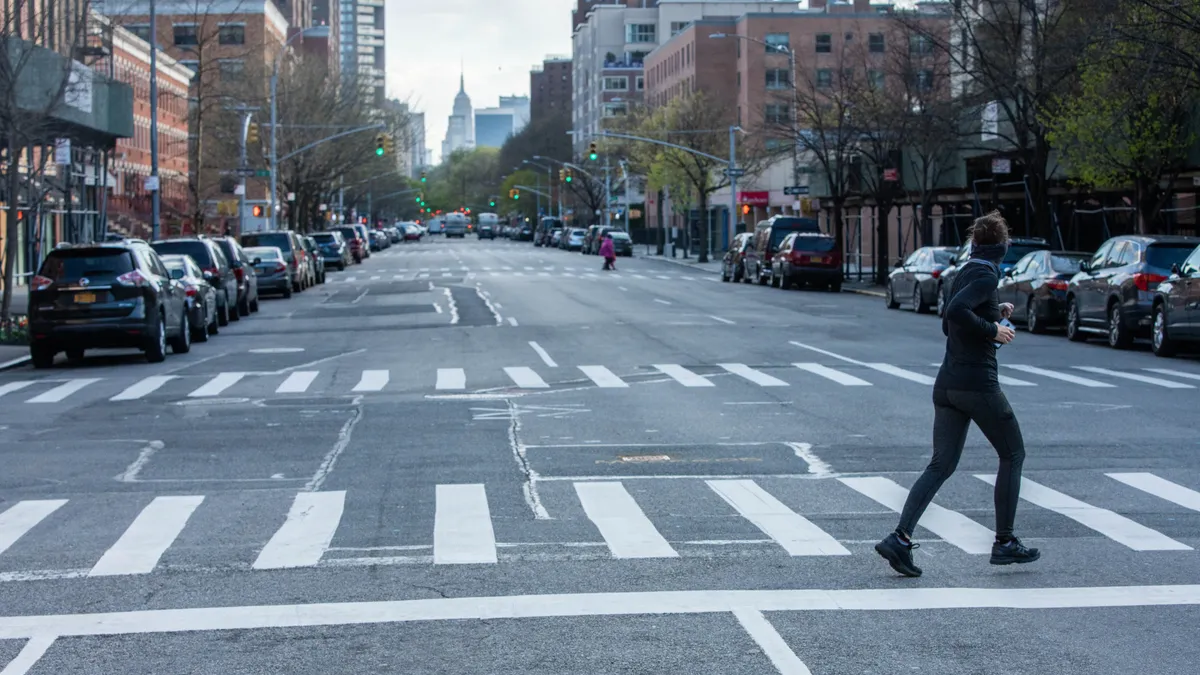Dive Brief:
- A Smart Cities Dive poll to newsletter subscribers and Twitter followers found 40% of respondents would most like to see car-free streets survive beyond the novel coronavirus (COVID-19) pandemic.
- The poll, which asked readers and followers which trend — car-free streets, touchless payments or ticketing, virtual events or remote work — they'd most like to continue after the pandemic, garnered more than 1,000 responses. The findings are as follows:
- The poll ran from May 8 through May 12, during a time when cities are discussing strategies to reopen economies and pursue long-term resilience in the face of an uncertain future.
Dive Insight:
The concept of car-free streets gained a wave of notoriety in January when San Francisco turned Market Street into a pedestrian promenade. Since then, cities have looked to temporary car-free streets as a way to grapple with residents seeking the benefits of the outdoors while adhering to social distancing restrictions.
Cities including Oakland, CA, Minneapolis and Washington, DC are all now testing car-free roadways, while New York City has revisited the idea on seven miles of asphalt after an unsuccessful pilot of the concept.
"I think there will be more public buy-in to this idea that the streets could be used for things more than just moving and parking cars, and people are hopefully a little more open to that idea now," Greg Billing, executive director of the Washington Area Bicyclist Association, said in an April interview.
The trend of remote work came in close second in the poll (28%), which may signal the benefits city leaders are seeing in enabling employees to work from home, including reduced congestion and greenhouse gas emissions. The trend of virtual events was last in the poll (12%), which may be indicative of how virtual events have been carried on in the wake of the pandemic. While many organizations are receptive to the virtual event concept, some have faced initial challenges in terms of organization and digital capabilities.
During the time of the poll, Smart Cities Dive also asked newsletter subscribers what long-term impacts they think the pandemic will have on cities, and for takeaways from the experience. In an emailed response, MOB Advocacy Founder Michael O'Brien suggested clean energy and sustainability has been brought to the forefront in the wake of this health crisis.
"Policy makers and even regular citizens have seen dramatic improvements in air quality," O'Brien wrote. "I believe it is demonstrating that there is a chance that climate change is reversible, and are looking at ways to keep going on this trajectory."
O'Brien also suggested this time will call for a new push for broadband access, as some citizens struggle to work or learn from home, and a new push for local governments to get creative in spending.
The topic of remote work was also addressed in an email from reader Steve Birdlebough, chair of the Committee on Transportation and Sustainable Communities at Sierra Club California, who predicts more cities will see a rise in telecommuting. He said he has observed that more people attend Zoom meetings than traditional in-person events, and he plans to "open most of the in-person meetings that I control to Zoom participants."
LEED Green Associate Lina Alferi Stern responded with suggestions for cities to rethink institutional settings for retirees and decentralize housing for aging populations.
"I would like to see initiatives that incentivize low income homeowners ... to build additional units on their properties for elderly and affordable housing populations," Alferi Stern wrote in an email. "Instead of incentivizing large developers, can we create a model and financing mechanisms so that low-income homeowners get the economic opportunities they need [and] the elderly and low-income populations get housing within their chosen neighborhoods."
To keep up with all of our coverage on how the new coronavirus is impacting U.S. cities, visit our daily tracker.












